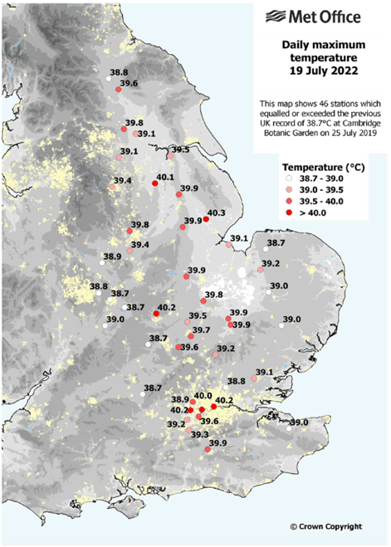Valuing Lives: understanding the economic and psychological impact of climate change on wellbeing
26 July 2023 | By: Newcastle University | 5 min read
Mounting evidence suggests that the variability of heat and extreme weather patterns significantly affect wellbeing, leading to premature mortality.
In this blog we explore recent research from Dr Irene Mussio, Prof. Susan Chilton, Prof. Darren Duxbury and Dr Jytte Nielsen into the risks associated with mortality resulting from extreme weather events in the UK. Read on to learn why coordinated research and policy are crucial for a sustainable future.
Contents
1. The impact of climate change on people's lives
3. The risk-risk trade-off methodology
5. Further work and links to the Global South
The impact of climate change on people’s lives
The adverse effects of climate change on human health are increasingly acknowledged as a critical global concern, and addressing this impact was identified as a key priority for the UN COP27 conference.
The impact of extreme weather will affect not only terrestrial and marine ecosystems, but also population health, livelihoods, local and regional economies. Among the nations grappling with the consequences of climate change, the United Kingdom (UK) is projected to face severe outcomes, particularly in relation to extreme weather events such as floods and heatwaves, with temperature records broken in both 2022 and 2023. Studies show that six out of 10 people in Great Britain think that rising temperatures will affect them by 2030.
The time for solutions
Solutions to reduce the risks associated with extreme weather events are urgently needed but must be considered from economic and societal perspectives.
While implementing policies aimed at reducing mortality risk due to extreme weather events will yield obvious health benefits, policy decisions to commit scarce resources must be informed by an economic valuation of policy consequences. Changes in mortality risks can be monetised for evaluation purposes using the preference-based Value of a Prevented Fatality (VPF) measure currently used in the UK for policy appraisals.
The VPF method (developed and pioneered by the late Emeritus Professor Michael Jones-Lee and colleagues at Newcastle University) puts a monetary value on the risk to human life by looking at how much people would be willing to pay to reduce the risk of casualties occurring in different situations, such as road, rail or drowning accidents.
The risk-risk trade-off methodology
The recent paper, 'A risk-risk trade-off assessment of climate-induced mortality risk changes' explores the risks associated with mortality resulting from extreme weather events in the UK.
The researchers employ a non-monetary valuation methodology - risk-risk trade-offs (RRTO) - to explore whether people would prefer to reduce the risks of death from extreme weather events or traffic accidents and, if so, by how much.
What does the risk-risk trade-off methodology involve?
The RRTO approach involves presenting survey participants with hypothetical choices between moving to one of two areas – one in which the traffic risk would be higher than in the current area and one in which the extreme weather event risk would be higher.
The advantage of this scenario is that respondents only need to make a trade-off within a single dimension (risk), rather than across two dimensions (money and risk), which is the usual approach taken in economics.
Participants are presented with a single RRTO question, which is randomly selected from nine options varying by size of change in risk. This question involves trading off mortality risks between extreme weather events and traffic accidents. The risk of traffic accident mortality is the risk used to establish the VPF in the UK (other risks could be used in the trade-off depending on the country of focus to calculate the VPF).
This data is combined and analysed to produce a relative risk ratio (a summary number or premium) for traffic accidents and extreme weather events for the UK population.

Unprecedented extreme heatwave, July 2022. Source: Met Office.
What does the study show?
The extreme weather event context premium
The study used a representative sample of UK adult residents (based on gender, ethnicity, and age) and collected responses from 1198 participants. It reveals the existence of an extreme weather event context premium in the UK, with values ranging from 1.2 to 1.6.
A premium exceeding 1 is indicative of people desiring greater allocation of resources towards addressing the human (mortality) impact of extreme weather event risks.
This premium indicates that members of the general population in the UK place a higher value on reducing mortality risks associated with extreme weather events compared to traffic accident mortality risks—an indicator of a "context premium."
This context premium can be used to calculate a VPF for extreme weather events for policy purposes. Our researchers used the traffic accident VPF - calculated by the Department of Transport (£2.14m, Dec 2021) - to peg the context premium and obtain an extreme weather event VPF. This mathematical exercise translates into an extreme weather event VPF range of £2.52 to £3.41 million.
Understanding psychological distance to climate change
The study highlights the significant role played by psychological factors in individuals' risk trade-offs, particularly psychological distance to climate change.
While psychological insights can be used in the development of behavioural interventions, they also address the call made by Robinson and Hammitt (2011) for greater attention to be given to the ways in which various factors influencing individual decision-making can impact the economic evaluation of policy outcomes.
The perceived psychological proximity or distance of extreme weather event mortality risks, among other climate change-related risks, has significant implications for RRTOs, VPF estimations, and VPF-based policies. Therefore, the study incorporates validated measures of Construal Level Theory as one of its instruments.
Construal Level Theory refers to the social psychological understanding that the more distant a concept is from the individual, the more abstract it will be thought of, while the closer the concept is, the more concretely it will be thought of.
Findings from the study indicate that individuals who perceive themselves as psychologically close to climate change, value the reduction of extreme weather event mortality risks at almost two times the value placed on reducing traffic accident mortality risks (compared to the context premium base range of 1.2-1.6).
What does this mean for UK policy?
Given the current plans in the UK to mitigate climate change and enhance resilience against extreme weather events, it is crucial to understand individual preferences regarding climate change-related events, specifically the risks associated with extreme weather-induced mortality.
These key results emphasise the importance of incorporating the value of reducing extreme weather-induced mortality risks into climate-related policy assessments. The study's results contribute to the ongoing discussion surrounding policy decision-making related to climate change.
Further work and links to the Global South
The findings from this study have wide-reaching implications across a number of areas.
The study emphasises the significance individuals attach to reducing risks associated with extreme weather-induced mortality. It also confirms the presence of a context premium and identifies psychological distance to climate change as a pivotal determinant of this premium.
As climate change intensifies and extreme weather events become more frequent, understanding individual preferences for mitigating mortality risks linked to climate change-related events becomes increasingly critical.
Ongoing research aims to explore other climate change-related events while also focusing on methodological advancements of the risk-risk trade-off approach. Work is underway to:
- incorporate multiple RRTO questions for each participant to improve the quality and quantity of information per respondent
- investigate the impact of climate change on morbidity, particularly in areas significantly affected by human and socioeconomic consequences
If the predictions made by the IPCC (2021) are accurate, the impact of climate change, including fatalities, is projected to escalate substantially,
This further increases the risks associated with extreme weather events like floods and heatwaves. Populations facing heatwave mortality risks in Vietnam and cyclone threats in the Ganges-Brahmaputra-Meghna river delta (including Bangladesh and the East and North East states in India) are expected to bear the bulk of these risks. Dr Mussio, Prof. Chilton, and Prof. Duxbury are currently working on these research questions at the moment, with funding from UKRI GCRF Living Deltas Hub.
References
- Department for Transport UK. (2022). Transport Analysis Guidance DataBook. Accessed 14 December 2022.
- IPCC. (2021). Climate Change 2021: The Physical Science Basis. Contribution of Working Group I to the Sixth Assessment Report of the Intergovernmental Panel on Climate Change. [Masson-Delmotte, V., P. Zhai, A. Pirani, S.L. Connors, C. Péan, S. Berger, N. Caud, Y. Chen, L. Goldfarb, M.I. Gomis, M. Huang, K. Leitzell, E. Lonnoy, J.B.R. Matthews, T.K. Maycock, T. Waterfield, O. Yelekçi, R. Yu, and B. Zhou (eds.)]. Cambridge University Press. In Press.
- Mussio, I., Chilton, S., Duxbury, D., & Nielsen, JS. 2023. A risk-risk trade-off assessment of climate-induced mortality risk changes. Risk Analysis: An International Journal. 1-17.
- Office for National Statistics (ONS) and UK Health Security Agency (UKHSA). Excess mortality during heat-periods: 1 June to 31 August 2022. Accessed 04 July 2023.
- Robinson, L.A. & Hammitt, J.K. (2011). Behavioral economics and regulatory analysis. Risk Analysis: An International Journal, 31(9), pp.1408-1422.
- United Kingdom Met Office. 2022. Unprecedented extreme heatwave, July 2022. Accessed 04 July 2023.
You might also like
- Read the full paper: A risk-risk trade-off assessment of climate-induced mortality risk changes
- Learn more about the researchers:
- Visit the Newcastle University Business School website and explore more of its research.
- Read about the UKRI GCRF Living Deltas Hub including a Q&A with Dr Mussio about her role within the Hub.
